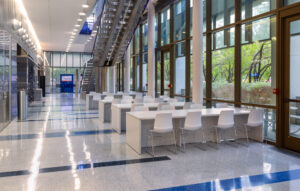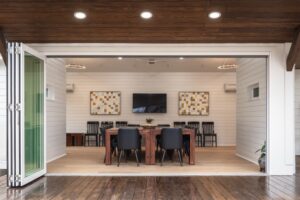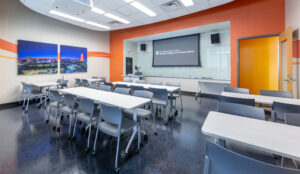UT’s Office of Academic Space Planning and Management works with campus partners to make sure that academic space is assigned correctly, utilized effectively, reported accurately, and, when needed, upgraded to be energy and environmentally efficient, more learning-inclusive, and more forward-thinking in educational design.

The Moody College of Communication was another recent project focused on the College’s student-service areas. Spaces were updated to add advising, recruiting and tour services for prospective services. In addition, they integrated space for student advising, a career center and student study space. The result was an energetic and cohesive design that better accommodates student needs and increases space for collaboration and study.
“Both projects are examples of the office providing support in classrooms and learning-related spaces throughout the University while adhering to the principles of sustainable design and construction,” said Ross Johnson, Assistant Vice Provost and Director of Academic Facilities Planning and Management.


When the office takes on projects to revamp classrooms or build new spaces, the organization considers several things. Environmental impact and sustainability are among a long list of other items (ADA compliance, technical upgrades, inclusive learning needs for all students and faculty, etc.) that the office keeps in mind when tackling projects. New classrooms and new learning spaces change a student’s educational experience, so each new renovation must be carefully planned to ensure that the benefits are felt now and long into the future.
“UT has set sustainability goals and we want to make sure we align with those requirements,” said Johnson. “At the same time, sustainability and environmentally conscious design are important to our students, faculty, and the future of our planet.”
The office upholds the UT System standard of LEED Silver ratings with thoughtful design decisions and product selections, such as storm water mitigation and recycling strategies, recycled and/or sustainable building materials, sourcing materials from the region, using renewable energy such as wind and solar, and low-emission building materials. On all projects, the team attempts to utilize materials that are durable, sustainable and cost-effective. For example, researching sustainable materials for use in classrooms and choosing furniture and lighting fixtures with environmental impact statements and certifications.
Current and future projects focus on aligning with earth-friendly goals by keeping in mind the impact of materials being used and how we can continue to push the needle forward in reducing climate change. With the variety of research and learning environments on campus, the Space Planning and Management team continues to keep the University’s sustainability mission in mind when planning projects.
Ultimately, the University strives to build sustainable and highly effective learning environments for our students. While the impact may not always be quick or obvious, UT is committed to improving our campus to create spaces that support student success, enable faculty to perform research, and allow staff to work productively.